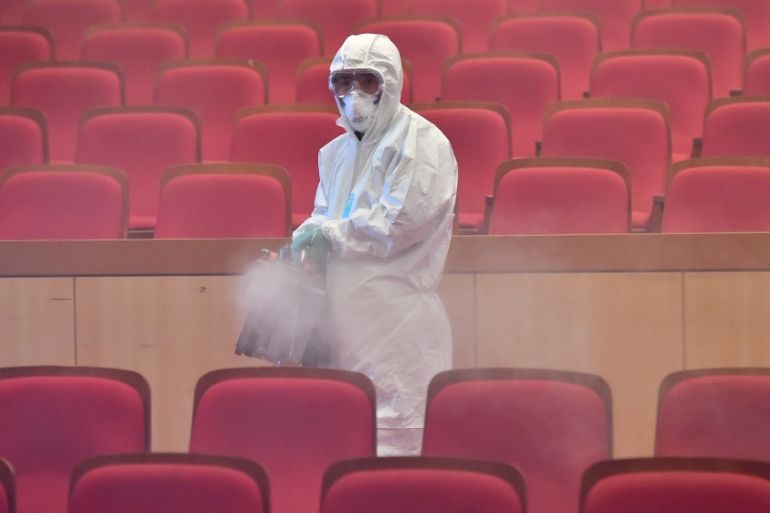WHO sees no need for MERS travel curbs
Sweeping restrictions including airport screenings not among steps recommended as virus claims 11th victim in S Korea.

Manila, The Philippines – The World Health Organization has said it is not recommending travel bans or sweeping airport screenings as part of the measures to prevent the spread of the MERS virus, which has now killed 11 people in South Korea.
The news came as South Korea’s health ministry reported on Friday that a 72-year-old woman had died at a hospital south of Seoul.
Keep reading
list of 4 itemsThe inexplicable rise of kidney disease in Sri Lanka’s farming communities
Europe endured record number of ‘extreme heat stress’ days in 2023
Deadly Sahel heatwave caused by ‘human-induced’ climate change: Study
Four new cases of the MERS, or Middle East Respiratory Syndrome, virus were also reported, bringing the total to 126, the world’s largest outbreak outside of Saudi Arabia.
One case was reported from China.
|
|
Alison Clements-Hunt, WHO’s spokesperson in Manila, told Al Jazeera most cases of MERS had been limited to healthcare facilities, where patients carrying the virus came in direct or close contact with another person.
“Unless you have close contact, it is unlikely that you will catch MERS. That’s why it passes in healthcare facilities, because it tends to be in close contact,” she said.
“The World Health Organization does not recommend a travel ban,” Hunt said, adding that it does not “actively recommend screening measures” at airports either.
What is advisable, she said, is that the government should have the ability to identify if travellers come from a country where MERS is “actively circulating”, and determining if the passengers have come in close contact with a person carrying the virus.
“Obviously if someone is sick, travels with a virus and has to go into a healthcare facility in another country, that’s where we are seeing the clusters [of cases]. Most of the [cases] we see are in healthcare facilities. They are not out in the general population.”
The WHO regional office, which covers many Asia-Pacific countries, is based in Manila.
‘Spreads like droplets’
Hunt also said that there is “no evidence” at the moment that the MERS virus is airborne.
“Evidence to date is that it spreads like droplets. So that’s why it needs a relatively close contact in order to spread,” she said.
According to the WHO, MERS is a “zoonotic” virus that is transmitted from animals to humans.
Its origins “are not fully understood” but medical analysis suggested that it originated from bats, then transmitted to camels.
Reports said more than 2,400 schools have been closed in South Korea as a result of the outbreak.
|
|
Still, Hunt said “it’s not so likely” that the cases will quickly spread in the region, given the measures taken by South Korean health authorities.
“What’s more likely is that we will see cases in other countries occasionally coming from the Middle East, because that’s where actually the virus is circulating. That’s where we think it originates.”
She said that while the cases in South Korea are “not alarming” and “not different” from what the WHO monitored in the Arabian Peninsula, she said countries should remain “vigilant”.
“The South Koreans are putting the measures that the WHO recommends, which is isolation and good infection prevention control in hospitals,” Hunt said.
Meanwhile, in the Philippines, the health ministry said there were no reported cases in recent months.
But at least one Filipino nurse who worked in Saudi Arabia tested positive for MERS in February 2015.
Three other cases were confirmed in 2014, but later tested negative.
At least two other Filipino nurses had died of MERS in Saudi Arabia in 2013 and 2014.